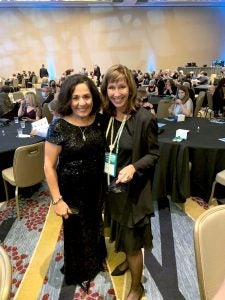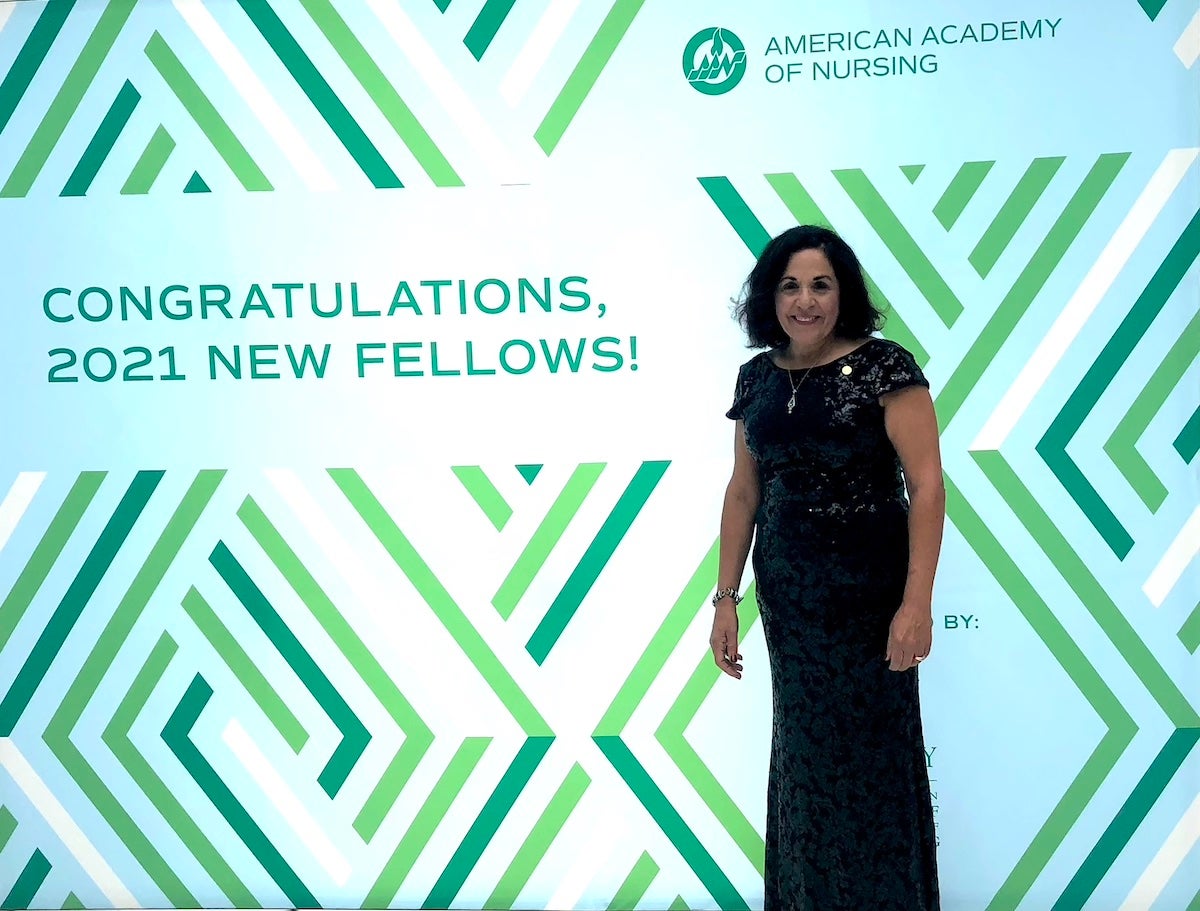Marie Ghazal, CEO of the RI Free Clinic, has also been inducted as an AAN Fellow
A prominent URI College of Nursing alumna is calling it a career after years helping underserved populations receive the critical care they need, for which she was recently inducted as a Fellow in the American Academy of Nursing.
Marie Ghazal, ’77, DNP ’17, has announced her retirement as chief executive officer of the Rhode Island Free Clinic in Providence. She plans in early 2022 to leave the clinic that she has transformed into a critical resource for low-income Rhode Islanders who are do not have health insurance, and therefore lack access to quality, affordable health care. In 12 years running the clinic, Ghazal made it a mission to increase access to care for as many people as possible, while building a sustainable model for free clinics to survive in an increasingly costly healthcare environment.
“We raise money for all the services that help our patients — diagnostic testing, free medications, free dental services; truly comprehensive health care,” Ghazal said. “Every day, I hear stories from people saying if this clinic wasn’t here, they would suffer. I’m always amazed at what our providers do with the resources they have, and the generosity of the donors who give to the clinic, the health partners who provide additional services.”
Upon beginning at the clinic more than a decade ago, Ghazal set out to make access to services more equitable, eliminating a lottery system that had potential patients lining up outside the building each morning in hopes of having their name drawn to see a doctor. She worked to increase clinician and volunteer hours to move to an appointment-based system. The clinic now accepts about 50 new patients every month.
“It doesn’t mean everyone gets an appointment, but they don’t have to stand in line hoping to get picked. This is a more dignified way of doing it,” Ghazal said. “It was difficult to work in that environment and see how people just couldn’t get care, and these were people who all needed care. It was heartbreaking to turn away people who needed care. It’s been gratifying to me to know that we’ve given so many more people care because of the access we’ve given.”
Ghazal has also led an increase in services the clinic offers, even opening a free dental clinic in 2018, the first of its kind in the region. Increasing access and services for the underserved has been a mission throughout Ghazal’s career. Before taking the helm of the RI Free Clinic, she served as director of the Central Falls Health Center, a Community Health Centers Project Coordinator with the state Department of Health, and vice president and chief nursing officer for Providence Community Health Centers.
“I always wanted to work on increasing access to the underserved,” Ghazal said. “It started in my early roots when I was growing up in Central Falls, in a community where health care and dental care was a luxury for people. When I started at URI undergrad, I did a few classes in the community and I worked in the CF rec department. I ended up doing a health fair, and I found I really liked the focus on the community and working with people who really needed care. From that I knew I wanted to build my career in the area. That’s why the community health centers were the ideal avenue for me to work in.”

Ghazal continued to expand the work of the clinic and her own role in its future, as well as that of free clinics in general. She returned to URI to earn her doctorate degree in 2017, with the goal of researching the sustainability of free health clinics. Taking the Providence clinic as an example, Ghazal has an annual operating budget of just $1.4 million, a small portion of the millions such a clinic requires. She depends on donations, volunteers, partnerships and in-kind service donations from other health providers — all of which she personally helps recruit — leveraging another $7 million a year in partnership contributions to keep the clinic operating. Partnerships include hospitals to perform diagnostic tests, pharmacies like CVS to help with medications, and private medical practices to provide common procedures like colonoscopies.
Her doctoral dissertation, written in tandem with URI nursing Professor Betty Rambur, focused on such efforts.
“It was all about nursing actions to help a free clinic sustain. It really came down to networking and building relationships and partnerships to help raise money to sustain the services,” Ghazal said. “I felt that going back to school at URI stimulated me and focused me on working in areas that help the clinic. It helped me articulate more with funders and donors; helped me work with my board. The research helped a lot; I feel I contributed to the research of the free clinic network nationwide, because there wasn’t anything written about this.”
Ghazal’s efforts have not gone unnoticed, highlighted by her recent induction as an AAN Fellow. “It’s a great point in my career. I think it’s the highest honor a nurse can receive, so it’s a great point in my life to be able to achieve that. It’s about my work in the free clinic and the time I’ve dedicated to working with the underserved population, and really expanding access to the underserved that really helped me receive that honor. I’m just so grateful.”
Ghazal is continuing to run the RI Free Clinic until her planned retirement in March 2022, at which point the Rumford resident plans to take some time to relax and spend with family before deciding on her next move.
“I still plan to contribute in some way to make a difference in some area, but just one that’s a little less stressful,” Ghazal said, reflecting on her career helping others. “I know I’ve made a difference in the lives of other people who just would not have gotten care. That feeling is great. I feel good knowing that I helped to do that here.”

